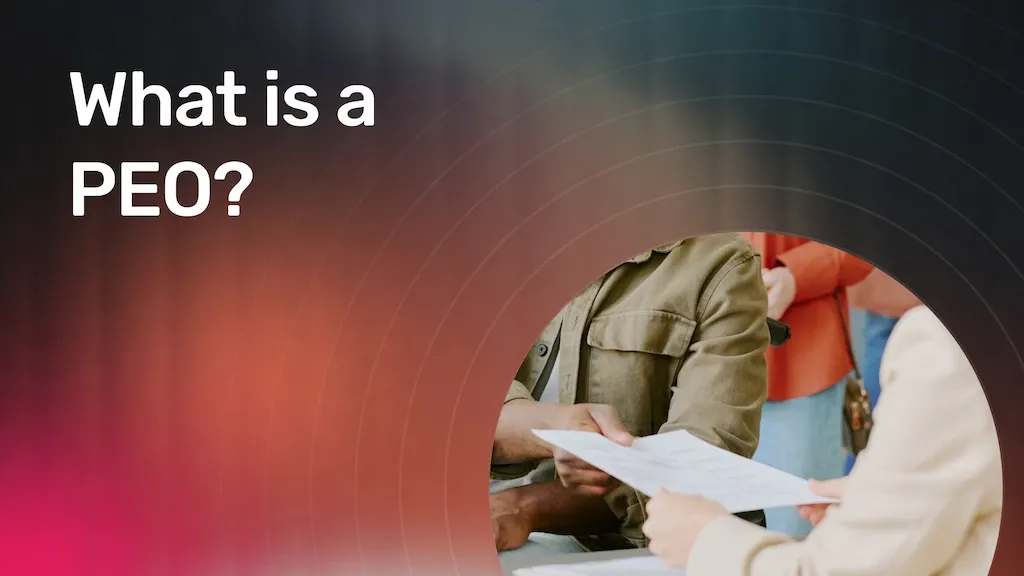What is a PEO? Understanding Co-Employment and HR Support Services
Running a business is exciting, but it comes with its fair share of challenges, especially when it comes to managing employees. From payroll and taxes to contracts and compliance, the admin side of things can quickly become overwhelming.
That’s where a PEO comes in.
In this blog, we’ll explain exactly what a PEO is, how co-employment works, what kind of services you can expect, and how to decide if it’s the right choice for your business. We’ll also cover the differences between PEOs, EORs, and staffing agencies, because let’s be honest, these terms get thrown around a lot.

What is a PEO?
PEO stands for Professional Employer Organisation. It’s a company that helps businesses manage the "people side" of things.
When you partner with some of the PEO companies, you're entering into a co-employment relationship. This means the PEO legally shares certain employment responsibilities with you. You stay in charge of your team’s daily work and business decisions, while the PEO takes over much of the HR, payroll, and compliance tasks.
In simpler terms, it’s like hiring a full HR department, payroll service, and benefits manager all in one, without actually bringing them in-house.
This setup is most useful for small and medium-sized businesses that want to offer a professional employee experience but don’t have the resources to build a full HR team.
What does co-employment mean?
Co-employment is a legal agreement where you and the PEO both have roles in managing your employees.
You, the business owner, manage daily operations, work assignments, performance reviews, and business goals. The PEO becomes the "employer of record" for legal and tax purposes. They handle payroll, taxes, benefits, compliance, insurance, and more.
This might sound risky, but it actually protects you in many ways. For example, the PEO assumes some legal risk and responsibility for staying compliant with employment laws.
You don’t lose control. You gain a partner who takes care of the admin work, so you can focus on growing your business.

What are the key functions of a PEO?
Working with a PEO covers a wide range of services that most businesses find hard to manage alone.
📃 Payroll and tax administration
PEOs process payroll on your behalf, ensuring employees are paid correctly and on time. They also handle tax calculations, withholdings, filings, and year-end paperwork.
🏥 Employee benefits
PEOs can provide access to health insurance, dental and vision plans, retirement savings options, and other perks that small businesses often can’t afford on their own. Since PEOs pool many companies together, they can negotiate better rates.
⚡ Workers' compensation
PEOs manage workers’ compensation policies and handle any claims. They also help with accident prevention and safety training.
📄 HR compliance and risk management
Labour laws change all the time. PEOs stay on top of regulations to make sure your contracts, policies, and procedures stay compliant.
🎓 HR support and training
From onboarding to employee handbooks and even training courses, PEOs offer tools and advice to help you manage your workforce more effectively.
🚪 Recruitment and onboarding support
Some PEOs assist with writing job ads, sourcing candidates, screening CVs, and onboarding new hires, so you can scale faster without sacrificing quality.
📅 Record keeping and documentation
PEOs store and manage employment records securely, including contracts, tax forms, performance reviews, and leave tracking, so you always have access to what you need.

Benefits of working with a PEO
From my experience, a good PEO can be a game-changer for busy founders and small teams trying to balance growth with compliance.
Access to better employee benefits
Even if you're a small company, a PEO can give you access to healthcare, pensions, and other perks usually only offered by large companies. This helps you stay competitive when attracting talent.
Reduced administrative workload
All the boring paperwork? The PEO handles it. You get more time to focus on customers, product, and growth strategies.
Lower risk and stronger compliance
You won’t have to worry about missing a new law or getting fined for something you didn’t know about. A PEO keeps you updated and protected.
Cost savings
Better insurance rates and fewer HR mistakes mean less money wasted. Plus, you reduce the need to hire a big internal HR team.
Helps attract and keep good employees
A solid benefits package and smooth onboarding process help you stand out from other employers and keep your team happy.
Easy to scale
Whether you’re hiring two people or 20, your PEO can scale services as you grow, adapting to your team’s needs.

Who uses a PEO?
PEOs are popular among startups without dedicated HR teams, growing small businesses, companies expanding into new regions, industries with complex compliance needs (like healthcare, tech, and construction), and business owners who just want less admin in their lives.
Potential drawbacks of using a PEO
No service is perfect, and PEOs come with a few things to consider:
- Shared control: Some business owners don’t like sharing responsibilities with an outside company.
- Legal complexity: Co-employment is a legal relationship, so you’ll need to carefully review contracts.
- Costs: Some PEOs charge a percentage of payroll, which can get expensive if you have a large team.
Also read: What Are the PEO Pros and Cons You Should Know in 2025?
PEO vs Your team: Who handles what?
Function | You (Business) | PEO partner |
| Day-to-day work management | ✅ | ❌ |
| Hiring/firing decisions | ✅ | ❌ |
| Payroll processing | ❌ | ✅ |
| Benefits management | ❌ | ✅ |
| Legal compliance | Shared | Shared |
| Training and onboarding | Shared | Shared |
How to choose the right PEO for your business
When selecting a PEO, here are some things to keep in mind:
- Look for certifications (like ESAC or other national accreditations)
- Check industry experience: Do they understand your sector?
- Ask about pricing: Do they charge a flat fee or a % of payroll?
- See what tech they offer: A good dashboard can save hours.
- Request references: Ask to speak to current clients.
Take your time. A good PEO should feel like a trusted partner.

What is the difference between PEO and EOR?
People often confuse these two, and to be fair, they do sound quite similar! But they work very differently and are used in different situations.
A PEO (Professional Employer Organisation) enters into a co-employment relationship with you. You stay the legal employer and manage your team directly, while the PEO helps with HR, payroll, compliance, and benefits. This only works in places where you already have a legal business entity.
An EOR (Employer of Record), on the other hand, becomes the legal employer of the person you’re hiring. You still manage the person’s day-to-day work, but the EOR takes care of everything else - contracts, taxes, compliance, payroll, benefits, etc. This is great for hiring in countries where you don’t have a registered company.
Think of it like this:
- Use a PEO if you're hiring in your own country or a country where your business is already set up.
- Use an EOR if you're hiring in a new country and don’t want to open a legal entity there.
To learn more about the difference between the two, you can also read our blog: EOR vs PEO
Is a PEO the same as a staffing agency?
Not at all. A staffing agency helps you find and place temporary or contract workers. They’re focused on short-term recruitment and headcount support.
A PEO supports you with the full-time employees you already have. They step in after hiring to help with everything else—from payroll and taxes to benefits and legal compliance.
Think of it like this: Staffing agency = hiring help. PEO = HR and admin help.
How can Native Teams help?
At Native Teams, we understand how difficult it can be to manage HR, payroll, and compliance, especially across multiple countries. That’s why we offer both PEO and EOR solutions designed to support your business and your employees.
If you're hiring locally and just need help with HR and benefits, our PEO services can support your team while you remain the legal employer. But if you're expanding internationally and don’t want to set up a legal entity, our EOR solution steps in to handle employment, tax, and compliance responsibilities in full.
From automated payments to multi-country compliance and benefits management, Native Teams is built for modern businesses that want to focus on growth, not paperwork. We’ll help you stay compliant, reduce admin work, and give your team the experience they deserve.
Conclusion
Choosing to work with a PEO isn’t just about outsourcing admin tasks; it’s about getting the right support to help your business grow. From handling payroll and benefits to making sure you’re staying on the right side of employment laws, a PEO can take a huge weight off your shoulders.
That said, a PEO isn’t a one-size-fits-all solution. It’s important to weigh the pros and cons, understand your legal responsibilities in a co-employment setup, and choose a partner that fits your industry and growth plans.
In my opinion, if you’re looking for more time to focus on running your business and less time stressing over admin, a PEO is well worth exploring.
Key takeaways
- A PEO is a partner that helps with payroll, HR, benefits, and legal compliance.
- It works through a co-employment model; you run the business, they handle the admin.
- PEOs are different from EORs and staffing agencies, so choose based on your needs.
- A good PEO can save time, reduce stress, and help your business grow.
